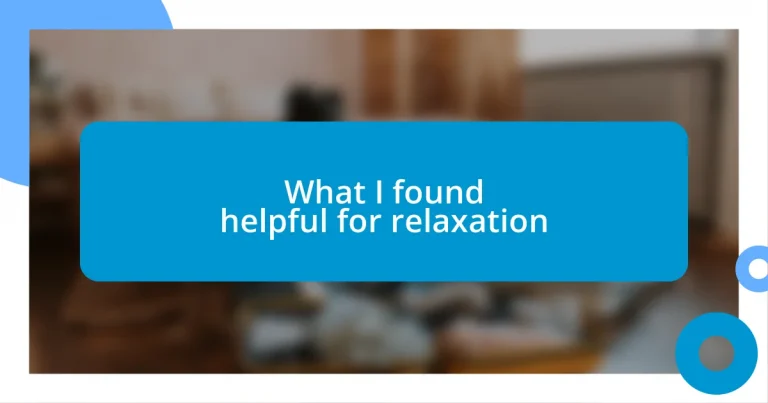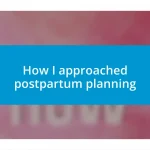Key takeaways:
- Relaxation techniques like deep breathing, progressive muscle relaxation, and mindfulness meditation can effectively reduce stress and enhance overall well-being.
- Regular relaxation practices contribute to better sleep, improved immunity, and heightened focus, ultimately leading to a healthier lifestyle.
- Creating a calming environment through lighting, natural elements, and soothing sounds significantly enhances the relaxation experience.
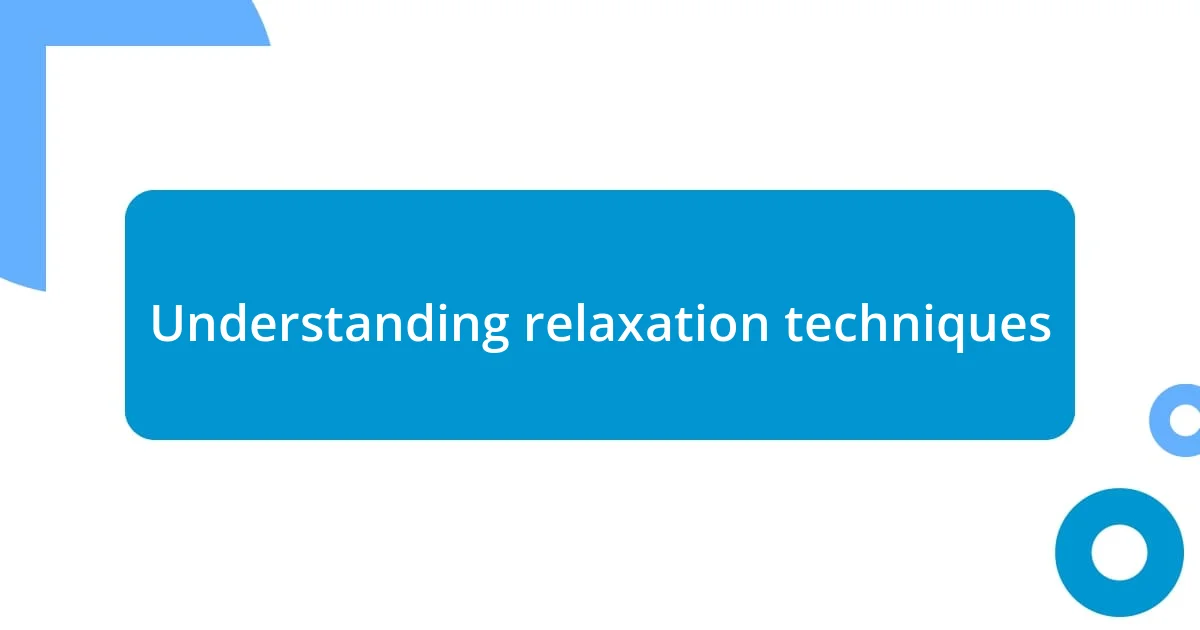
Understanding relaxation techniques
Relaxation techniques encompass a range of practices designed to help manage stress and promote overall well-being. Personally, I’ve experienced the transformative power of deep breathing exercises. They not only calm my mind but also ground me, making me wonder: have you ever tried to just pause and take a few deep breaths during a hectic day?
One method that really resonates with me is progressive muscle relaxation. This technique involves tensing and then relaxing different muscle groups, which I’ve found to be incredibly effective after a long day. I remember the first time I tried this before bed—I could feel the tension melting away. Have you ever noticed how your body holds onto stress? This technique can be a game-changer.
Another avenue worth exploring is mindfulness meditation. I vividly recall the stillness I encountered during my first session; it was like discovering a hidden sanctuary within myself. It urges you to focus entirely on the present moment, allowing distractions to fade. Isn’t it fascinating how often we overlook the beauty of now? Embracing stillness can be one of the most profound gifts we give ourselves.
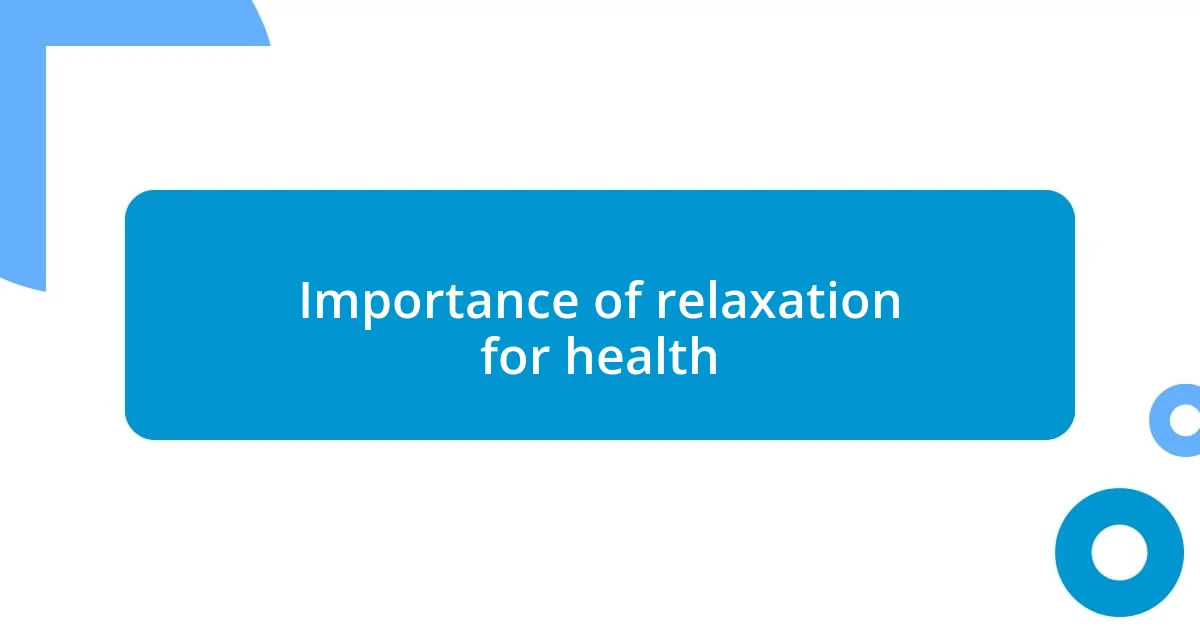
Importance of relaxation for health
Relaxation plays a crucial role in maintaining not only mental health but also physical well-being. I’ve noticed that when I take time to unwind, my body rewards me by feeling less tense, which can lead to improved sleep and better immunity. It’s amazing how a few moments dedicated to relaxation can positively impact our overall health.
In my experience, relaxation techniques can significantly lower stress hormones, which is something I’ve deeply felt during particularly stressful weeks at work. There’s this palpable sense of calm that washes over me as I consciously switch from a state of chaos to one of peace. Have you ever experienced that moment of clarity right after a deep relaxation session? That’s your body finding its balance.
The ripple effect of regular relaxation is profound. I’ve realized that prioritizing these moments can lead to enhanced focus and creativity in my daily tasks. It’s almost like clearing out the clutter in my mind and allowing fresh ideas to surface. How often do we allow ourselves to feel rejuvenated enough to approach our challenges with a new perspective? Embracing relaxation is not just a luxury—it’s essential for sustaining our health and vitality.
| Aspect | Importance of Relaxation |
|---|---|
| Reduces Stress | Helps lower stress levels, which can decrease the risk of health issues. |
| Improves Sleep | Enhances the quality of sleep, leading to better recovery and energy levels. |
| Boosts Immunity | Supports the immune system by reducing the production of stress hormones. |
| Enhances Focus | Increases mental clarity and boosts creativity for daily tasks. |
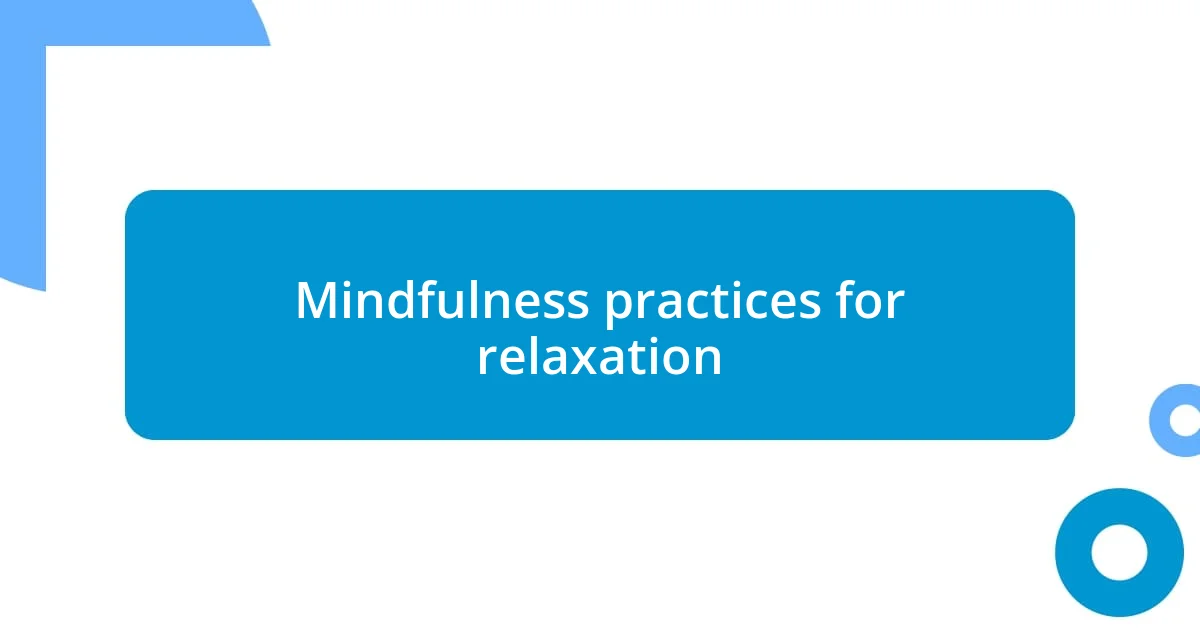
Mindfulness practices for relaxation
Mindfulness practices for relaxation
When I first delved into mindfulness practices, I was amazed at how this concept of being wholly present could shift my entire perspective. It’s a bit like switching lights on in a dim room; suddenly, everything feels clearer. One particular practice I’ve found helpful is guided imagery, where I visualize peaceful scenes to calm my mind. The vivid details of a serene beach or a tranquil forest not only distract me from stress but transport me into a much-needed mental getaway. Have you ever let your imagination drift somewhere soothing during a chaotic moment? It truly is magical.
- Mindful Breathing: Focusing on each inhale and exhale, I’ve noticed how it slows my thoughts and brings me back to the present.
- Body Scan Meditation: This practice involves mentally scanning my body from head to toe, which I’ve found to release tension I didn’t even realize I was holding.
- Nature Walks: Engaging with nature while practicing mindfulness, I pay attention to the sounds and sights around me, which imparts a deep sense of peace that stays with me long after I return home.
- Gratitude Journaling: Listing things I’m grateful for has become a daily ritual; it reshapes my mindset and fosters a sense of contentment that radiates throughout my day.
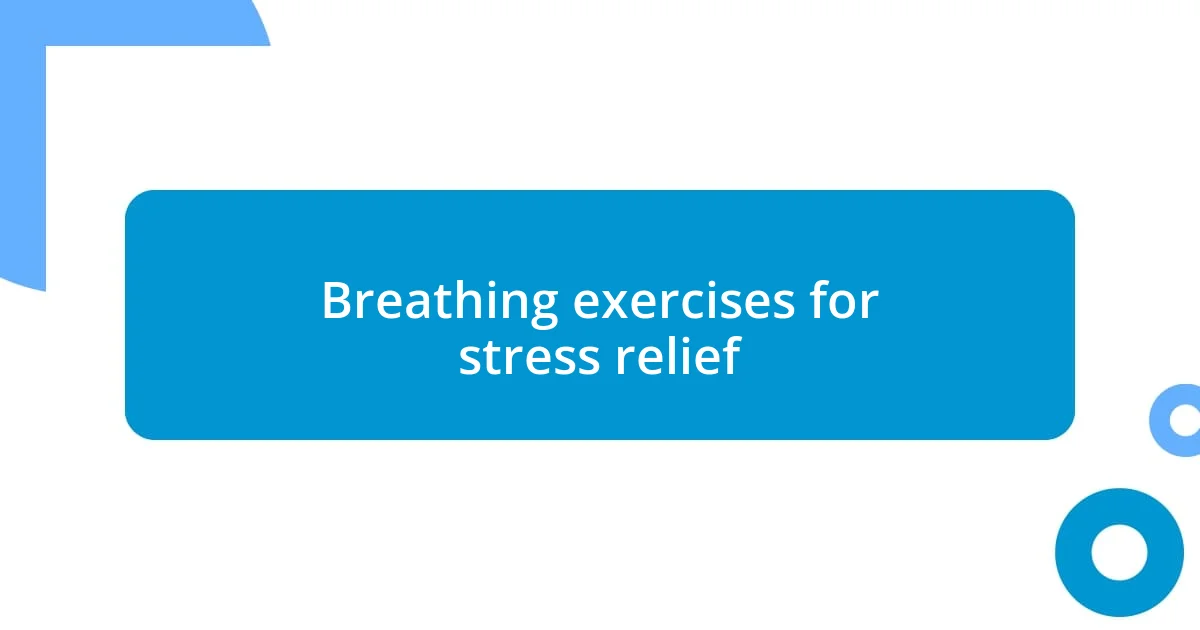
Breathing exercises for stress relief
Breathing exercises have become a cornerstone of my stress-relief routine. When I take a moment to focus on my breath, I can feel the tension melt away, almost like slipping into a warm bath. Have you ever noticed how just a few deep breaths can shift your mood? I remember one particularly hectic day at work when I spent five minutes practicing deep abdominal breathing in the quiet corner of my office, and it felt like I was flipping a switch back to calm.
One technique that I find especially grounding is the 4-7-8 method. I inhale quietly through my nose for a count of four, hold for seven, and then exhale completely through my mouth for a count of eight. It’s like a reset button for my mind. The structured rhythm not only calms my pulse but also clears the racing thoughts that can cloud my concentration. Have you tried counting your breaths while you inhale and exhale? It can be surprisingly effective at anchoring you in the present.
While practicing these breathing exercises, I often visualize a peaceful scene, like a gentle stream flowing through a forest. This imagery, combined with deep breaths, nurtures a profound sense of relaxation. I can distinctly recall a night when anxiety kept me awake; just a few moments of focused breathing and visualization transformed my racing mind into a serene space. Isn’t it fascinating how such a simple act can bring about such significant relief?
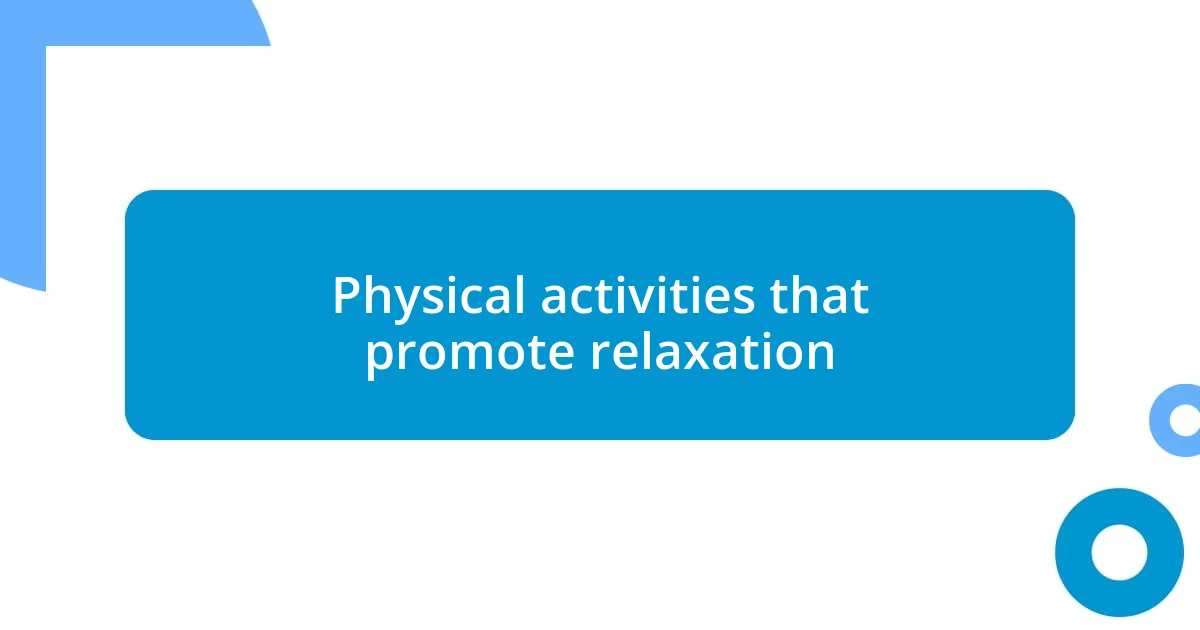
Physical activities that promote relaxation
Engaging in physical activities has always been a transformative way for me to unwind. For instance, I’ve found that yoga not only stretches my body but also provides mental clarity. After a long day, a gentle flow on my mat makes everything feel a bit lighter, almost like shedding weights I didn’t even know I was carrying. How about you? Have you ever rolled out a mat after a stressful day and felt that instant release?
Walking has also been a game changer for me. I often lace up my shoes and stroll through my neighborhood, allowing the rhythm of my steps to guide my thoughts. There’s something incredibly soothing about the repetitive nature of walking that lets my mind wander freely. During one of these walks, I found myself observing the subtle changes in the leaves and the colors of the sky, which surprisingly brought me a sense of calm and connection to the world around me.
Additionally, I’ve taken up swimming, and it’s been one of the most refreshing ways to relax. The sensation of water enveloping me as I glide through the pool creates a quiet bubble where worries dissipate. A few laps can feel like a mini-vacation for my mind. If you’ve ever tried swimming, you know the feeling of almost floating away from your concerns. What is it about the water that makes everything seem so much lighter? For me, it’s the freedom and weightlessness that allows my thoughts to flow as smoothly as the strokes I make.
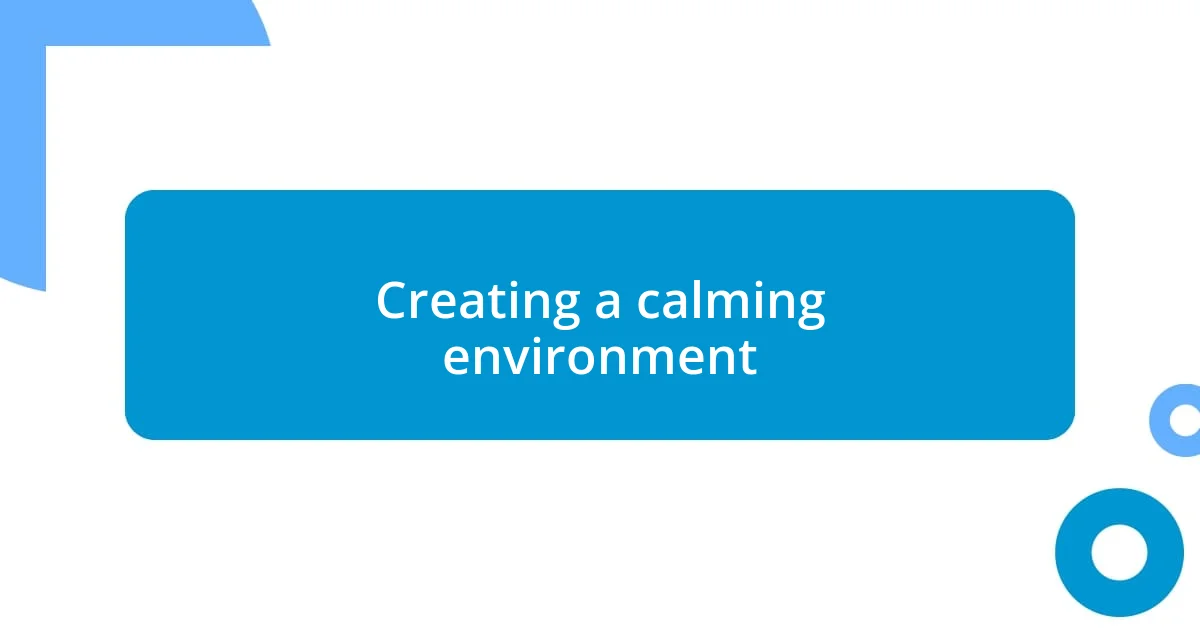
Creating a calming environment
Creating a calming environment is essential for relaxation. I’ve learned that the lighting in a room can drastically influence how I feel. For instance, dimming the lights in my space or using soft, warm-colored lamps creates a cozy atmosphere that invites tranquility. Have you ever walked into a room that felt bright and stark and instantly felt a bit tense? I have, and it’s amazing how a little adjustment can make such a big difference.
Incorporating natural elements into my space has been another game changer. I love placing plants around my home, as they not only purify the air but also bring a refreshing touch of nature indoors. I can recall a moment when I added a small fern to my desk; its vibrant green left me feeling more centered and connected to the earth. How do you feel when surrounded by nature? For me, it’s as if the chaos of daily life fades away with each glance at those lush leaves.
Lastly, I’ve discovered that creating a soothing soundscape can turn a mundane environment into a personal oasis. When I play soft instrumental music or nature sounds, it envelops me in serenity. Just the other evening, I set a playlist of gentle piano melodies while sipping herbal tea, and it transformed my living room into a haven of peace. Have you tried using sound to enhance your own environment? I’ve found that immersing myself in calming sounds allows me to step back from daily stress, even if just for a moment.












